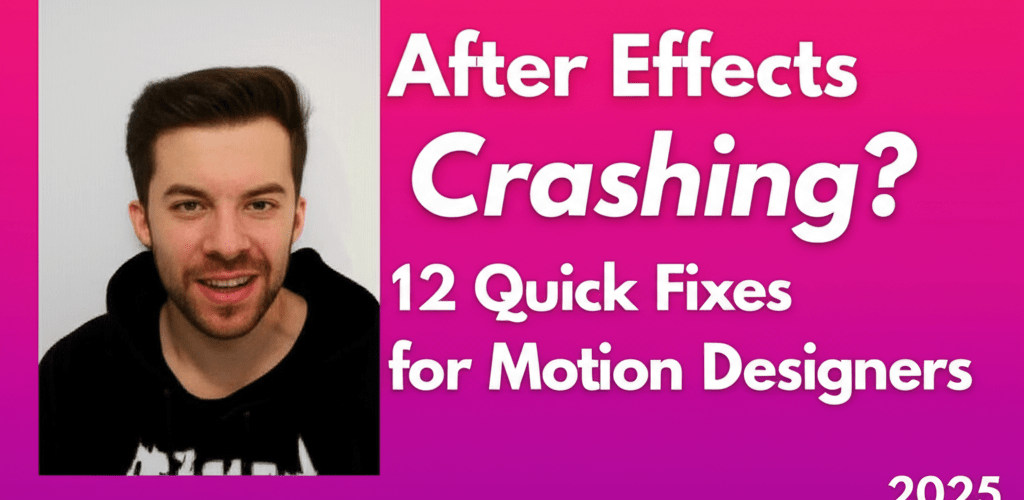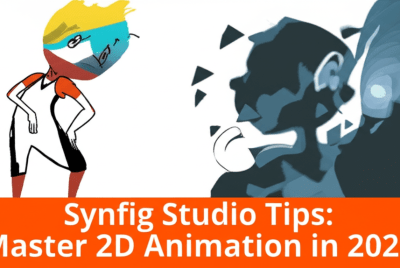After Effects Crashing? 12 Quick Fixes for Motion Designers 2025
Ever been in the middle of a killer motion graphics project when After Effects decides to throw a tantrum? We get it. Few things halt creativity faster than an unexpected crash, freeze, or refusal to open. But don’t fret! Most instances of After Effects crashing have straightforward solutions. This guide is all about getting you back to designing, fast. Here’s a quick look at what we’ll cover:
- Restarting After Effects and your computer often clears temporary glitches.
- Clearing your media and disk cache can prevent slowdowns and instability.
- Updating your GPU drivers is crucial for stable performance and rendering.
- Ensuring your computer meets system requirements avoids many common issues.
- Disabling third-party plugins can help resolve launch failures.
- Resetting preferences can fix corrupted settings preventing After Effects from starting.
- Allocating more RAM and using fast SSDs significantly improves workflow stability.
- Checking for corrupt media files can pinpoint specific project issues.
- Keeping After Effects and your operating system updated prevents many bugs.
- Strategic hardware upgrades like more RAM and a powerful GPU boost performance.
- Implementing workflow tips like pre-composing and regular memory purging reduces strain.
Why does After Effects keep crashing and freezing for motion designers?
When After Effects crashes, it’s rarely random; it’s usually a clear sign of underlying issues. Understanding these causes is your first step toward a lasting After Effects error fix. Common culprits include not enough system resources (like RAM, CPU, or GPU), outdated drivers, corrupt project files, troublesome third-party plugins, or a bloated media cache. Pushing your system with high-resolution footage, complex compositions, or heavy effects can also lead to instability. Pinpointing the exact trigger for your After Effects crashing problem is key to effective troubleshooting.
What are the immediate solutions when After Effects crashes unexpectedly?
Before diving into deep diagnostics, try these quick fixes. They often resolve most instances of After Effects freezing or unexpected shutdowns.
- Give After Effects & Your Computer a Fresh Start: Seriously, it sounds too simple, but restarting can clear temporary glitches and free up precious system resources. Close After Effects completely, restart your entire computer, then try opening your project again.
- Clear Out Your Media Cache and Disk Cache: A full or corrupt cache can really bog down After Effects and cause crashes. Think of it as spring cleaning for your software.
How do I clear my After Effects cache to improve performance?
Clearing your cache is a straightforward process that can make a big difference:
- Head to After Effects (on macOS) or Edit (on Windows) > Preferences > Media & Disk Cache.
- Click “Empty Disk Cache” and then “Clean Database & Cache.”
- Restart After Effects for the changes to take effect.
- Double-Check Your System Requirements: Make sure your machine meets or ideally exceeds Adobe’s recommended specifications for After Effects. Running this demanding software on an underpowered computer is a common reason for After Effects not opening or performing poorly.
For those new to this powerful software, knowing its demands is super important. We’ve got a great guide on getting started with After Effects for beginners to help optimize your setup.
How do I troubleshoot common After Effects errors and issues?
If those immediate fixes didn’t do the trick, it’s time to dig deeper into specific problems that cause After Effects crashing.
Why is After Effects not opening and what steps can I take to fix it?
When After Effects just refuses to launch, it’s incredibly frustrating. Here’s what might be happening:
- Verify File Permissions: Ensure After Effects itself and your project files have the correct read/write permissions. On Windows, running After Effects as an administrator can sometimes solve this.
- Temporarily Disable Third-Party Plugins: Faulty or outdated plugins are a frequent cause of After Effects not opening. Hold down the Shift key while launching After Effects to temporarily disable all third-party plugins. If it opens, you’ll need to figure out which plugin is the culprit and update or remove it.
- Reset After Effects Preferences: Corrupted preference files can stop After Effects from starting. Hold down Ctrl+Alt+Shift (Windows) or Cmd+Option+Shift (macOS) immediately after launching After Effects to reset them. You’ll see a prompt to confirm.
What should I do when After Effects keeps freezing during my motion graphics workflow?
A constantly After Effects freezing issue can absolutely tank your productivity. Try these solutions:
- Allocate More RAM and Disk Cache Space: In Preferences > Memory & Performance, give After Effects more RAM to play with. Also, ensure your Disk Cache is located on a fast SSD with plenty of free space. Want to know more about how much RAM you really need? Check out our article on is 16GB RAM enough for graphic design or if you need more.
- Keep Your GPU Drivers Updated: Outdated graphics drivers are a major cause of instability, glitches, and rendering problems. Visit your graphics card manufacturer’s website (like NVIDIA, AMD, or Intel) to download and install the very latest drivers. This is a critical step for an effective fix After Effects strategy.
- Examine Your Project File’s Health: Sometimes, a specific element within your project, maybe a corrupt media file or an overly complex expression, can trigger After Effects crashing. Try importing your project into a brand new, empty After Effects project file to see if the problem persists. It’s also smart to save iteratively, creating multiple versions as you go. Consider checking different graphic design file formats if you suspect media corruption.
How can I fix common After Effects errors and prevent them from happening again?
Specific error messages can be a bit scary, but many have simple solutions. Here’s a general After Effects troubleshooting approach:
- Free Up Disk Space: After Effects needs a lot of disk space for caching, temporary files, and renders. Make sure your system drive and especially your cache drive have ample free space. Running out of space can directly lead to After Effects error fix situations.
- Check for Corrupt Media Files: If your project consistently crashes when trying to render or play specific footage, that media file might be corrupt. Try re-importing it or converting it to a different format.
- Keep After Effects Updated: Adobe regularly rolls out updates that include bug fixes and performance improvements. Always make sure your After Effects is running the latest version. Sometimes, an older version can cause compatibility issues. However, if a *new* update causes problems, it might be worth considering rolling back to a previous stable version.
If you find yourself constantly battling software limitations or frequent crashes, it might be helpful to explore alternative motion graphics software that might offer a more stable experience for your specific workflow or hardware.
How can I optimize my system to prevent After Effects crashes in the future?
Being proactive with your system setup can drastically reduce the chances of After Effects crashing. Think of these as smart investments in your creative productivity.
Which hardware upgrades are essential for smoother After Effects performance?
Boosting your hardware is one of the most effective ways to make After Effects sing:
- More RAM is Your Friend: After Effects absolutely devours RAM. Aim for at least 32GB, but 64GB or even 128GB is truly ideal for complex projects. More RAM means less reliance on disk cache and much smoother real-time playback. Learn more about choosing the best laptop processor for graphic design and how it impacts RAM usage.
- Invest in Fast SSDs: Use speedy Solid State Drives (SSDs) for your operating system, After Effects installation, project files, and critically, for your media cache. This dramatically improves read/write speeds, eliminating bottlenecks that contribute to After Effects freezing.
- A Powerful GPU Makes a Difference: A dedicated graphics card with plenty of VRAM (Video RAM) significantly speeds up many effects and renders. Make sure it’s fully supported by After Effects. Curious about the right CPU for your workflow? Check out our insights on the best processor for After Effects.
What are the best software practices for stable After Effects use?
Smart software habits keep your system healthy:
- Regular Driver Updates: As we mentioned, keeping your graphics drivers, chipset drivers, and any other relevant hardware drivers up to date is paramount.
- Plugin Management: Only install plugins you genuinely need, and always keep them updated. Outdated or poorly coded plugins are a frequent cause of needing an After Effects error fix.
- Operating System Maintenance: Keep your OS updated and perform regular disk cleanup to remove temporary files and keep things tidy.
What workflow tips can help prevent After Effects from crashing on complex projects?
Adjusting your workflow can greatly reduce strain on After Effects:
- Pre-compose When It Makes Sense: Grouping layers into pre-compositions can simplify your main timeline and make rendering more efficient, reducing the strain that can lead to After Effects crashing.
- Utilize the Render Queue Wisely: For intricate renders, using the Render Queue to export your compositions can be far more stable than direct exports.
- Purge Memory Regularly: Head to Edit > Purge > All Memory & Disk Cache to manually clear resources when After Effects starts to feel sluggish.
- Simplify Your Compositions: If it’s not absolutely necessary, avoid excessive layers, effects, and super high-resolution assets in a single composition. Breaking down complex tasks helps a lot.
Understanding the nuances of these applications is key, and often, the workflows share similarities. For instance, you might wonder about the differences between motion graphics and image manipulation. We’ve got a detailed comparison: After Effects vs. Photoshop: How do they compare for graphic designers?.
What are common questions about After Effects crashing and how to fix them?
Here are some frequent questions designers ask when dealing with After Effects instability:
- Q: How do I stop After Effects from crashing on startup?
- A: Try resetting your preferences by holding Ctrl+Alt+Shift (Windows) or Cmd+Option+Shift (macOS) immediately after launching. Also, attempt to launch while holding Shift to disable third-party plugins. Make sure your GPU drivers are updated, too.
- Q: What causes After Effects to crash?
- A: Common causes include not enough RAM, outdated GPU drivers, a full or corrupt media cache, conflicting third-party plugins, corrupt project files, or simply pushing your system beyond its limits with complex compositions. Understanding these helps with effective After Effects troubleshooting.
- Q: How do I clear After Effects cache?
- A: Go to After Effects/Edit > Preferences > Media & Disk Cache. Click “Empty Disk Cache” and “Clean Database & Cache.” This often resolves performance issues and prevents After Effects freezing.
- Q: Is my computer powerful enough for After Effects?
- A: Check Adobe’s official system requirements. For smooth performance, aim for at least 32GB RAM, a fast multi-core processor (explore the best processor for graphic design and video editing), a dedicated GPU with ample VRAM (8GB+), and fast SSDs for your OS, programs, and cache. If you’re encountering persistent After Effects crashing, an upgrade might be necessary.
Dealing with After Effects crashing can be incredibly frustrating, but you’re not powerless. With the right knowledge and a systematic approach to After Effects troubleshooting, most issues are totally solvable. To keep your creative flow smooth and uninterrupted, remember these key takeaways:
- Always start with the simple stuff: restart your computer and clear those caches.
- Keep your software and hardware drivers updated; they’re the foundation of stability.
- Pay attention to your system’s resources – After Effects is a demanding beast!
- Regularly check project file integrity and manage third-party plugins.
- Proactively upgrade your hardware (RAM, SSDs, GPU) for long-term smooth performance.
- Adopt smart workflow practices to reduce strain on the application.
Don’t let crashes derail your amazing motion graphics work. Apply these solutions, stay proactive, and keep creating!
Authoritative External Resources:
- Adobe After Effects Help: Troubleshooting crashes
- Adobe After Effects Community Forum
- Wikipedia: Adobe After Effects


